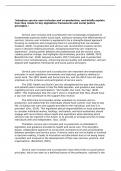‘Introduce service user inclusion and co-production, and briefly explain
how they relate to key legislative frameworks and social justice
principles.’
Service user inclusion and co-production are increasingly recognised as
fundamental practices within social work, aiming to enhance the effectiveness of
services. Service user inclusion is explained to be a strengths-based approach
focusing on resilience and recognising that it is something that can develop
(Cadeno, 2023). Co-production and service user involvement involves service
users in decision-making processes, recognising that they are ‘experts by
experience’, sharing power between the professionals and the service users,
creates positive change, and highlights discriminatory practice. (BASW, 2023;
Beresford & Carr, 2018; Goossen & Austin, 2017) Inclusion and co-production
tend to occur simultaneously, enhancing service quality and satisfaction, and are
aligned with legislative frameworks and social justice principles.
Service user inclusion and co-production are important and emphasised
principles in most legislative frameworks and statutory guidance relating to
social work. The 2001 Health and Social Care Act, and the 2014 Care Act place
emphasis on the inclusion and participation of service users.
The 2001 Health and Social Care Act strengthened the way that the public
and patients were involved in how the NHS operates, and guidance was issued
regarding service user participation: ‘Our Health, Our Care, Our Say’ (SCIE,
2007). This emphasises that the user’s voice is important that they should have
a say over and contribute to the support they receive.
The 2014 Care Act provides similar emphasis on inclusion and co-
production, and states that the individuals should have control ‘over day-to-day
life, including over care and support provided to the individual, and how it is
provided’ (Gov, 2014). This legislation placed responsibilities on local authorities
to consider individual wishes, feelings, and beliefs, and local authorities should
engage with local citizens about needs and aspirations when deciding which
services may be required in the future, or to provide or arrange services to keep
individuals well and independent. (Gov, 2016).
Therefore, service user inclusion and co-production is embedded in
legislation and guidance provided to health and social care. This strengths-
based, collaborative approach to social work increases trust and accountability
between providers and service users. If service users are not included or involved
in decision-making, it leads to frustration and discontent due to not being heard,
consulted, and involved in the development of their own services, practice, and
organisations. (Beresford, 2001)
Service user inclusion and co-production have direct links to social justice
principles, which are seen as a defining feature of the profession, outlined in the




